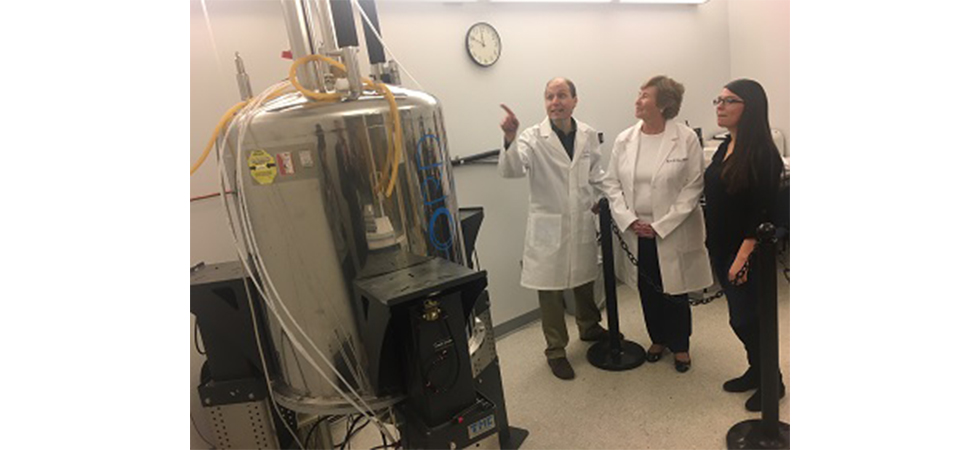“An MRI for chemists” dedicated at Assumption

With a new Nuclear Magnetic Resonance (NMR) spectrometer installed on campus, Assumption now has an “MRI for chemistry students” that has immediately expanded the quality of student and faculty research conducted at the institution.
The instrument, valued at $350,000, was donated by the Discovery Chemistry Group at GlaxoSmithKline in Waltham and funding for the renovation for the new facility and installation of the machine was made possible by longtime benefactor Janet Testa HD’07.
“Just as MRI provides a detailed look inside a patient’s body without surgery or radiation, NMR lets a chemist determine where all the atoms are located in a molecule, while leaving it intact for other uses; in other words, it’s an MRI for chemists,” said Professor of Chemistry Brian Niece, Ph.D. “With this instrument, our chemistry students will get hands-on experience with modern NMR equipment. They will learn to use the same software that is used in many labs where they may work after graduation.”
According to Prof. Niece, the NMR is the chemical equivalent of an MRI scanner and enables faculty and staff to explore detailed structures of various molecules, a task that, until now, required a process of sending samples off-site. The chemistry department plans to use the new equipment to conduct rigorous research that they were not able to do with the current spectrometer they have had for more than 20 years.
The NMR enables faculty and students to determine where all of the atoms are located in a molecule, while leaving it intact for other uses.
Julia Martin ’18, a chemistry major, shared that the new NMR will enhance the institution’s undergraduate chemistry programs. Martin, who has been using the old spectrometer during her time at Assumption, marveled at “what an old [one] looks like versus a new one and can see the improvement with the new spectrometer.” Martin added that underclassmen would be able to have the same experience as her, as students will use the old spectrometer in their introduction classes and the new machine in their advanced courses. “Being able to view the results between the two spectrometers will increase the students’ learning in ways they never imagined were possible,” she said.
After the first challenge of procuring the equipment was accomplished, the institution needed to find the space and the funds to properly house the new NMR. As she has done on a number of occasions in the past, Mrs. Testa stepped forward and generously donated the funds needed for the project.
“I thought it was a wonderful opportunity that this machine was offered to Assumption,” shared Mrs. Testa. “Something like this should be operational, so I thought it was important for [students] to have a functioning machine. Assumption has been a big part of our lives. Assumption is family to us, and is an important part and we love it.”
“I want to thank Mrs. Janet Testa, who donated the funds necessary to pay for the facility renovation and installation of the spectrometer in the Testa Science Center,” added Prof. Niece. “Since the Testa Science Center opened, Mrs. Testa has become something of a patron to our department, making regular donations to ensure that Assumption students are learning and conducting research on and trained upon the latest equipment and methods. We are extremely grateful for her ongoing support.”
Professor Niece also expressed the gratitude of his department to Chris Davie and Steve Skinner of GlaxoSmithKlilne’s Discovery Chemistry Group for their extensive efforts to facilitate the donation to Assumption of the NMR spectrometer.
The NMR spectrometer is housed in a glass room on the first floor of the Testa Science Building. Janet and her late husband, Richard ’69, made a generous gift to support the construction of the institution’s state-of-the-art 63,000 square-foot science center that was dedicated in 2004. The center features classrooms, laboratories, research and office space and is often used for events, performance and meetings. Ten teaching labs and seven faculty and student research labs provide the Assumption community with proper facilities to conduct important research. The center also features a rooftop greenhouse.
